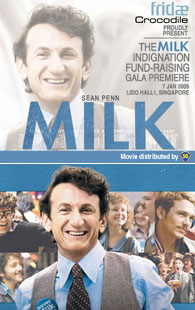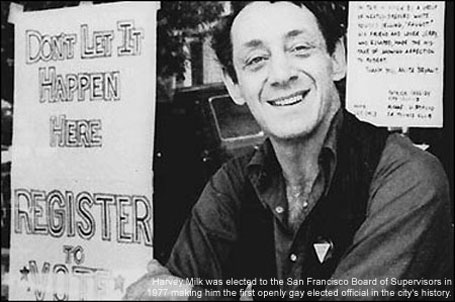When our stories get silenced, it's hard to imagine that we ever had - or that we ever will have - a history. So many things go untold, so many things are left unsaid. When I was a student in secondary school going through the painful awareness of puberty, I never would have thought that I was not alone, that friends were going through the same thing. And so the cycle of enforced silence continues. We quietly acquiesce to and comply with both written and unwritten codes of conduct that deny us our voice and our say.

Visit Fridae's Milk Microsite for more info and tickets to the MILK Indignation Fund-raising Gala Premiere in Singapore on Jan 7, 2009.
Now a student in California's Bay Area, I witnessed the reenergising of the queer movement over Proposition 8, which successfully eliminated the rights of gays to marry. Across the country, youths were beginning to tap into their rich history to lend themselves legitimacy - parallels were drawn with the civil rights movement, the Stonewall riots, the injunctions against interracial marriage. As intellectual arguments were advanced, activists found new ways to apply these ideas practically, organising phone banks and rallies. When the onerous proposition passed, gays moved - literally - out of the closets and into the streets.
It is in this political context that Milk - the much-awaited Harvey Milk biopic starring Sean Penn in the title role - makes its appearance. Harvey Milk's election to the San Francisco Board of Supervisors made him the first openly gay man in public office in California. In office, he used his clout to pass a comprehensive gay rights ordinance. His assassination by a colleague eleven months after being elected - and the subsequent mistrial that let the murderer off easy on please of insanity - made him a martyr for the cause. "If a bullet should enter my brain," Milk said on tape before he was killed, "let that bullet destroy every closet door."
Our collective memory, however, is short term. The AIDS crisis robbed the community of many who could have lived to tell the tale, and at any rate many of us seem too preoccupied with the present to have a perspective on the past. A dangerous prospect, because it is only when we know where we come from that we know where we are going to. Without a history, we are left without a future. And so the deafening silence leads to destruction.
Milk is the kind of film that doesn't come along quite often: its message is so pertinent to the social and political climate that it seems like only God could have ordained its creation. God, it seems, or the divinely inspired Gus van Sant. The biopic genre can often become flat and boring, but in van Sant's hands it becomes a truly magical experience. Van Sant - a consummate filmmaker - acknowledges the limits of the biopic by interposing Milk's final tape recording with scenes from his life. In so doing, the film becomes, rather than a final verdict on the life of the character (as biopics often are), a loose narration of disparate parts into a coherent whole.
Van Sant realises that the political can never truly be divorced from the personal - Milk functions at the periphery where the two meet, where stories become history. And so, though the movie is rife with instances of angry protests and noisy rallies, we never lose sight of the couples in the crowd, embracing amidst and in spite of the affairs of the state. At the film's awful climax, it is not so much the assassination upon which van Sant chooses to focus, but the poignant image of Tosca - a tale of love's treachery and betrayal, and purportedly Milk's favorite opera. So, even though Milk is (rightly) apotheosised as a martyred saint for the political cause, we know that he is human, all too human. Penn as Milk is unnervingly and uncannily believable; he has Milk down to the last nervous tic. Superbly rendered, Penn evokes Milk's humanity rather than his mythic status.
I watched Milk during one of the premiere shows at the Castro Street theatre (where parts of Milk were filmed). Young and old, men and women, straight and gay and everywhere in between were there to catch the momentous movie on its opening night. The communal spirit was overwhelming - after the show ended and you walked down Castro Street, you could tell who had watched it by the tears shining in their eyes and streaking down their faces. A house that is divided against itself cannot stand, and the beauty of Milk is that it has the ability to unite disparate factions with its simple and beautiful message.
And at the heart of the movie the message is this: come out. Don't be afraid of telling your story. Don't be afraid to break the silence, to take control of what you can control. As we tell our stories, they are woven together into the fabric of history. And when we have a history we can tap into the rich resources of our past to forge for ourselves a future. That is the importance of Milk - it returns to the youths of today and tomorrow the past that is rightfully theirs. And hopefully that student in secondary school going through the painful process of puberty will no longer have to quake in the shadows, thinking that he is all alone.
Born and bred in Singapore, Jireh is a student in California's Bay Area. In his spare time he likes to read and cook.
| Fridae and Crocodile presents The MILK Indignation Fund-raising Gala Premiere Date: 7 Jan 2009 (Wednesday) Time: 8.45 pm (Reception for VIP and guests from 8 pm) Venue: Shaw Lido 1 (Shaw Centre, Scotts Road) Tickets: US$25 (Standard) / US$50 (VIP*) Visit Fridae's Milk Microsite for more info and tickets. * VIP Tickets include goodie bags, pre-show reception and premium seats. All tickets purchased on Fridae Shop will be allocated the best seat available at the time of purchase. All proceeds will go to towards Indignation - an annual festival consisting of talks, art exhibitions, readings of plays and poetry, together with some social events, to be held in August 2009 - the same month as the country's national day celebrations. Organised jointly by gay advocacy group People Like Us and other community groups and individuals, the festival started in 2005 as a response to the unreasonable ban on parties for gays and lesbians, and heavy censorship of publications serving the community. All Indignation events are open to the public and are traditionally free of charge, in order to be accessible to everyone. |

